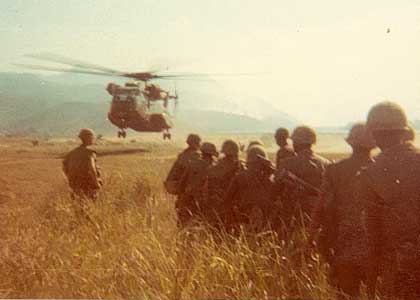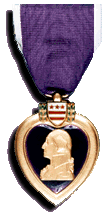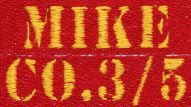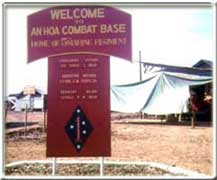
PFC. RONALD DE VERE DUNTZ
Born on June 12, 1948
From Des Moines, Iowa
Casualty was on March 6, 1969
in Quang Nam, South Vietnam
Panel 30W - - Line 53

Pfc. Ronald De Vere Duntz served with the 3rd Battalion, 5th Marines, M Company. His name stands proudly alongside his fellow Marines and FMF Corpsmen on the Mike 3/5 Wall of Honor.
Remembering Ronald Duntz
"When his fellow Marines were faced with a numerically superior force of enemy soldiers, Ronald heroically gave his life, while saving the lives of others near him."~Mike McFerrin
Pfc. Ronald De Vere Duntz arrived in Vietnam in the latter part of January, 1969, and was assigned to Mike Company, 3rd Battalion, 5th Regiment of the 1st Marine Division which was headquartered at the 5th Regiment combat base at An Hoa, some 30 miles south of Danang.
The company itself was very seldom at the combat base since we were on operations almost constantly. Ronald came out to the company in the field around February 1, 1969. Mike Company had just spent some 45 days enjoying a bit of a lull in heavy action, but was just reentering another phase of it when Ronald got there. I was officially the platoon guide. but spent most of my time as acting platoon sergeant when there was none, or when the platoon sergeant was spending most of his time as acting platoon commander when there was no lieutenant. I was the platoon sergeant when Ronald arrived.
At first glance, he was, as others that came with him, just another young man who had not proven himself yet, but would have to soon.
His quiet, non-threatening manner made him a very easy person to get along with, and initially worried his squad leader and myself since we knew what he was going to face in the harsh reality of combat. Well, within a week there were several contacts with the enemy, and Ronald proved to be a very stalwart Marine from the first one. In the midst of all the chaos, he performed his job well, and when it was over he was still the same easy going, likable guy. And in subsequent contacts, it became obvious that he had quickly learned to control the fear that runs rampant in everybody during these fights.
He was a great Marine that could be counted on by all around him. I was the platoon sergeant then also, and want to relate the circumstances because of his extraordinary heroism and some special circumstances that you should know. His death touched all of us
as greatly as his life had for several reasons.
Mike Company left a Fire Support Base out in the mountains to the southwest of An Hoa on March 2, 1969, to cross a valley and climb some mountains on the other side to find some enemy troops that we knew to be there. There were some 105 of us. We were ambushed on that morning by a small force as we made our way into the valley. It only delayed us for a couple of hours. We spent the night in the valley.
The following morning, we crossed the valley and began our ascent of the mountain range on the other side. By late in the morning on that day, March 3, we were halfway up when we encountered another ambush of a little more substance. We were delayed for several hours because the "canopy" of tree layers above us was so thick that it was difficult to find a place where it was thin enough to at least get a sling through to remove our casualties and a very unfriendly scout dog who would attack anybody that tried to get near his wounded handler.
By late afternoon, we found a place and called for a medevac. It was so late in the day that Company Commander opted to set us into a perimeter there where the medevac was coming. While we waited for the medevac, squad-size patrols were sent out in two directions just to recon the area we were in. One of these patrols ran into a large, heavily entrenched and camouflaged force some 70 meters further up the ridge. The squad lost 3 men killed, and one wounded.
Beginning at this point, other enemy troops in the area were summoned to close in on us, and coordinate a complete annihilation of our company. Just before dark, we intercepted one of the "message runners," and were able to translate the message. There were some 3,000 enemy troops within a day's march of us. Because of the number around us, only one medevac helicopter got in, and got the dog and his handler out. It barely got out because of the fire it received.
The rest of the day was spent first recovering a wounded Marine trapped behind a tree in front of an enemy bunker, and then attempting to recover the bodies of the three Marines who were killed in front of an enemy bunker. Not all were recovered by dark, and the attempts were suspended until morning. It gets very dark, very fast in thick forest. but the fighting continued around our perimeter all night as they surrounded it on all sides that the terrain would allow.
Ronald and I were in third platoon, and were covering an area that was completely accessible to the enemy troops. We fought all night as they came to within feet of us in the dense undergrowth. I had assigned Ronald's squad to a key area next to the trail because of the confidence I had in that squad. There were two "new" guys there, Ronald and PFC. Weaver, but both had already demonstrated that they were extremely sharp and would hold up. And hold up they did. The enemy never got into our perimeter that night despite repeated attempts through Ronald's squad.
4 March
On the morning of March 4th, we expected the enemy assaults to stop during daylight hours. They did not. They simply focused them on a couple of positions in our platoon, and launched them every 3 or 4 hours in the daylight. One of these positions was Ronald's. Ronald and his squad never faltered, called for reinforcements, or even took a casualty. They beat back every attempt. In the meantime, the platoon that had lost the men the day before continued to assault the enemy bunkers in attempts to recover the dead.
By noon, there was still one body left, and many more casualties had been taken. The enemy’s movements around our perimeter were increasing and artillery fire, helicopter gunships, Phantom jets, and "Spooky" AC-130 planes with large rapid fire machine guns began to be employed in a circle around us to try and keep the enemy back. The canopy had them all firing "blind," and the closeness of the enemy required that we talk their fire in as close as possible which made it very perilous for us also. This support continued non-stop through the night, and into the following day, March 5th.
5 March
On March 5th, all platoons began to assist in the attempts to recover the last body, but after multiple attempts throughout that day, our casualties had risen to the point that the Battalion Commander ordered us to get out of there. But there were not enough of us left to carry all of the dead and wounded. The Battalion Commander ordered another Marine company to come to our assistance. They were moved to a point where they would be ready to fight their way in on the following day, March 6th, and our platoon was selected from Mike Company to fight our way out to link up with them.
The evening of March 5th was a repeat of the previous two nights. We had now been in almost constant contact with the enemy for some 54 hours. In our platoon, I don’t know of anybody who had gotten any sleep during the previous two nights. Some had tried to cat nap a bit during the daylight hours when there was relatively less fighting, but that wouldn’t last long since the enemy was so close when they fired on us it had everybody too scared to not be watching every bush and tree in front. The lack of sleep was taking its toll. That night many of us finally slept some. Even in the midst of the fighting, I slept some 2 hours total that night. Each of the others in my position also did.
6 March
At first light on the morning of March 6th, we began preparing for the breakout. I learned from the squad leaders that their men had also given in to fatigue, and each had got some sleep. It was in the conversation with Ronald’s squad leader early that morning that I learned that Ronald had “the dream” during the night. When one is living in the midst of constant death, and the threat of it, there are senses that are often made more acute. I, and others, knew about “the dream” because it happened to others who, like Ronald, communicated it to somebody. I will explain this as best I can because it is a true blessing as far as I understand it.
I was trapped in the “kill zone” of an ambush during my first day in the field in Vietnam. I was the only survivor, and the company pulled back leaving me for dead, after calling all of our names and not getting an answer from anybody. The others couldn’t answer because they were dead. I couldn’t answer because I was laying right in front of an enemy machine gun playing dead. What I went through in my mind was all the terror and horror about my own impending death. I cried for myself, and for my family. I prayed to God. After about 45 minutes of this, a stark bolt of something struck me, and my mind and body snapped as my tears stopped, acceptance of my own death washed over me, the fear left me, and a quiet peace came to my mind, body, and soul. Of course, as it turned out I escaped what seemed to be an inescapable situation.
“The dream” was when one had the dream of their own death prior to the situation occurring. This was not a standard dream or nightmare. Somehow, this “dream” gave each what appeared to be absolute knowledge that it was going to happen. None ever gave particulars of the dream, so I do not know all that they saw and felt in it. But in each case, they made it clear that they knew they were going to die that day. It always happened the night before, and was never wrong.
Ronald knew nothing about the others. But he knew what he knew. His relating it to his squad leader was in the form of making the statement that he had the “dream,” and asking him to insure that his personal gear was taken care of. Of course, the squad leader told him to stop talking like that, but he insisted that the squad leader take care of his stuff.The blessing of “the dream” was that those who had it were already at the point when they woke up in the morning that I arrived at after 45 minutes of stark terror and misery, when I thought it was going to happen to me. They not only had no fear of what lay ahead, but had a calmness and serenity that was complete and thorough, and could be felt by others around them. And they never did not do their job correctly on their last day, so it eliminates any thought that they “welcomed” or “allowed” their death to happen.
At about 7 that morning, we had our last minute briefings on the course the other company was following to come to us, and how far out they were. All of us knew that what we were about to do was going to very difficult and dangerous, but also that the survival of the Company depended on it. Even at that point, if the enemy knew how few of us there were fighting, we would have been in deep trouble. The platoon commander and I moved down to the edge of the perimeter and the platoon commander yelled to Ronald's squad leader to put his squad on point. This was done because we needed the best there for this, and they were that. As usual, the most difficult task for a squad leader is picking a point man. It is a dangerous spot, and nobody wants to be the person that sends somebody there.
Ronald's squad leader, Curtis, turned towards his men with the pained look on his face about that decision. Ronald saw the look, and in his very easy going manner, stepped forward and said, "I'll take point." He followed it up with something like, "I haven't done it in a while. I think it's my turn." It was an obvious downplay of his own action. He was simply trying to make things easier for his squad, not be a hero. With what we were about to do there was no safe place anywhere in the column.
Even though we all knew this, Curtis and I exchanged glances in silent communication. Curtis went over to Ronald, and asked him if he was SURE he wanted to walk point without directly mentioning “the dream.” I chimed in with something, and a look to make it clear to Ronald that I, as platoon sergeant, had no problem with him changing his mind. He insisted he would be fine, didn't mind walking point, and without hesitation walked over to the trail. Again, Curtis and I looked at each other. We each had the authority to change his decision, but knew that there wasn’t anything to change it to that we could have any degree of certainty was safer.
Though point was dangerous, there were also times when the point was the safest place. At that point, we could really only pray for ALL of us, so we just moved to our places. His calm and serenity had passed to us in some degree as we turned to face our jobs. The platoon assembled, and Ronald's squad began moving out of the perimeter. They would be followed by the platoon commander and his radioman, the next squad, myself as platoon sergeant, then the last squad. Ronald's squad moved around a bend and I lost visual contact with them as the squad in front of me began moving. I moved in behind this squad, and was just preparing to leave the perimeter.
I was standing by a large tree when the air exploded into the sounds of battle as bullets and explosions came from around the bend. I fell behind the tree for cover, but this was only momentary since I had specific duties to fulfill once it was determined that it was an ambush as opposed to an entrenched force. That didn't take long. Fifteen or twenty seconds. My job was to mount an ambush reaction force from the rear squad. The rear squad leader was to insure rear security with one or two men.
The heavy fire and terrain made it very difficult to get an effective group together there, but two of us wound up attempting a flank assault on the ambush site that we couldn't see. I believe that the fury with which Curtis' squad was fighting combined with the two of us running through the bush and yelling and shooting (to create the image of many) made the enemy pull back far enough that we could get into the area of the point squad and secure it.The two of us who made up the reaction force got to Ronald first. Both of us could see something unusual had happened because of the number of rounds that he had taken. I moved back up the trail to insure troops were spread out for security, and to get a poncho to bring Ronald back on.
On the way, I checked with the rest of Ronald’s squad members. Pfc. Weaver was very painfully wounded, and the others were behind bullet-scarred trees. They were able to confirm exactly what had happened. Ronald had managed to save at least a couple of lives. When Ronald's squad had moved into the "kill zone" of the ambush, the enemy had sprung it. But in their haste, the enemy had not picked a good site. They could not get to others with Ronald upright.
There were 5 enemy gunners in the section where Ronald was, attempting to wipe out the first 7 or 8 of our men. Somehow, he managed to keep himself upright, and between the enemy and the others, for several seconds allowing them time to get cover and prepare to fire. From all I ever witnessed there, this required some incredible effort. In a nanosecond, Ronald knew the position he was in, and he chose to protect others as the end came. Those few seconds he stayed up saved many lives.
Ronald as a person was easy to know and like. Ronald as a Marine was a giant among men. He has not been forgotten by any who served with him. His sacrifice is known and respected by all of us.~Mike McFerrin
Semper Fidelis from the Marines of Mike 3/5






